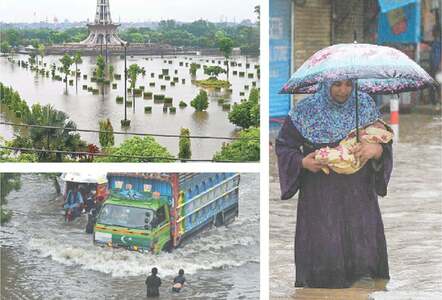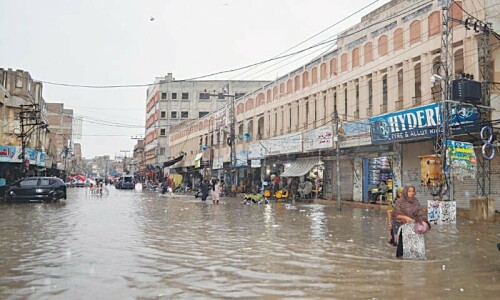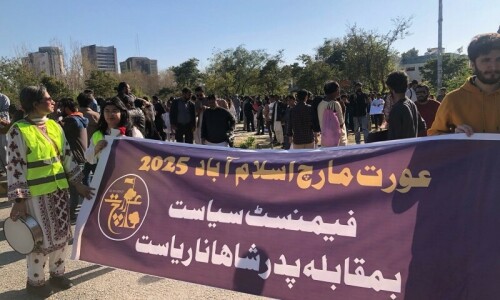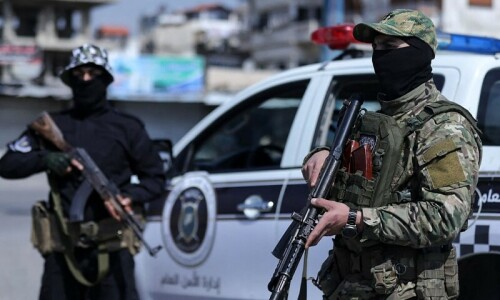Ever since massive flood-related damages to the drainage infrastructure of the Right Bank Outfall Drain (RBOD) in upper Sindh in 2022, the torrential rains caused severe damage to three series of RBOD I, II & III in the July-August leg of 2022 rains.
RBOD-II has been incomplete for the last two decades. However, RBOD I and III were completed by the Water & Power Development Authority (Wapda) in 2020 and 2021, respectively. Unprecedented Balochistan floodwaters coupled with heavy rains in Sindh damaged RBOD-II’s portions in 2022 and washed away RBOD I and III works.
These essential restoration works of RBOD I and III have remained unattended ever since for want of Rs8.3 billion project cost approval by the federal government.
These works were identified in a joint flood damage survey by the Sindh Irrigation Department and Wapda. Works with the above-mentioned estimated cost were submitted to the federal government for approval. This approval has been elusive, though monsoon rains have made their presence felt again in Sindh.
Karachi Chief Meteorologist Sardar Sarfaraz doesn’t rule out heavy rains in upper Sindh and Balochistan. He believes heavy rain is almost certain, and there is a high risk of flash flooding in Dadu, Jamshoro, and Kambar Shahdadkot due to heavy rainfall and flash floods from across the Kirthar range.
The Met Office’s 2022 data shows Khuzdar reported 237.1mm and 227.1mm of rainfall in July and August, respectively.
Sindh irrigation suffers during monsoons due to design flaws and breaches from earlier floods in the RBOD that have yet to be fixed
Such flows ultimately take a natural course up to Hamal Lake in Sindh’s Qambar-Shahdadkot and then through RBOD-I or Main Nara Valley Drain (western course of Nara), falling in Manchhar Lake before heading for the final destination, ie the Indus River.
But this is only after they wreak havoc on infrastructure and inundation of agricultural lands in hilly areas where communities depend on rainwater flows for agricultural purposes and often bear economic losses of crops.
The Rs8.3bn allocated in PC-I for RBOD-I & III mentioned that these works were important to protect local communities, agricultural land, and infrastructure against drainage issues and floodwater-driven crises.
Officials admit these works were identified in a joint survey conducted after approval was granted in a meeting held in the Chief Minister’s house on February 15 2023. Since then, the federal government’s approval of PC-I has been awaited.
Javed Memon, Project Director of the Sindh Flood Emergency Rehabilitation Project (SFERP), noted that ten breaches must be plugged in immediately. “Five of these breaches in RBOD-III are critical as banks of RBOD-III at five locations have simply disappeared from the ground due to floods 2022 damages,” he said.
In this case, water from hill torrents and rainfall would travel towards Qamar Shahdadkot if breaches remained unplugged. Five breaches, in particular, had widened to a size equivalent to the length of multiple reduced distances (RDs). The other five breaches were smaller but needed attention.
Sindh Irrigation Secretary Zarif Khero was said to have allowed SFERP management to carry out works of RBOD-III if fiscal space was available in SFERP, given the emergency involved. Mr Memon confirmed having written to the World Bank to seek approval for these works, which involved an indicative cost of Rs300m-400m.
Two months ago, Wapda’s Member (water) Jawaid A Latif, on June 4 2024, sensitised the federal secretary of water resources to take necessary action for approval of Rs8.3bn PC-I for rehabilitation of 2022 damages in RBOD-I & III “to prevent any loss of public lives or infrastructure” during the forthcoming monsoon 2024. It was his second correspondence on the same subject after the February 23 2024 letter.
Wapda Sindh GM (South) Amir Mughal conceded the works were important, and that’s why a joint survey was conducted. “But, Wapda itself can’t deal with their operation and maintenance [O&M] issues as these projects stand completed and need to be handed over to Sindh, and provinces have to deal with them,” he said.
RBOD-I & III are a pain in the neck for communities living there, as rains have wreaked havoc in past monsoons. Wapda built both drains in the past amidst Sindh’s reservations. RBOD-I falls entirely in Sindh, starting from Qambar Shahdadkot and reaching Jamshoro to be connected with RBOD-II, whose completion is delayed even after the lapse of two decades.
RBOD-III starts from Balochistan and reaches Sindh while carrying wastewater. It is connected to RBOD-I/MNVD in Sindh’s Qambar Shahdadkot district. RBOD-I then reaches Jamshoro to empty all the toxic water in Manchhar Lake in Sehwan.
This link of RBOD-I is to be connected with RBOD-II, which has remained incomplete for the last two decades and is supposed to carry the entire wastewater with the designed discharge of 3,500 cusecs from two provinces to the Arabian Sea.
Sindh has been dithering from taking over control of RBOD-I & III despite Wapda’s insistence on it. Sindh is unable to complete RBOD-II either. Incumbent Irrigation Minister Jam Khan Shoro had already told the National Assembly’s Standing Committee on Water Resources in May 2022, in the presence of Wapda officers, that until RBOD-II is built, Sindh won’t take over RBOD-I & III as they, too, have design defects.
Wapda’s Member (water), in continuation of the June 4 letter, also wrote to the Sindh irrigation minister on June 15 2024, to urge him to take immediate action for “taking over RBOD-I & III from Wapda”.
Wapda, according to the communication, has already withdrawn its establishment from RBOD-I & III due to “unavailability of funds since March 31 2023”, and this has been communicated to the Sindh government on November 28 2022 and April 3, 2023, for Wapda was an executing agency and required necessary approval regarding allocation/release of funds for execution of particular works.
Wapda said RBOD-I and III were completed in 2020 and 2021, respectively. Their handing/taking over was discussed with Sindh in 2021. Sindh didn’t finalise the handing/taking over until June 2022 due to a lack of minor rectification works, whereas Balochistan’s part of RBOD-III was handed over to Balochistan for O&M (regular upkeep).
After 2022 damages to RBOD-I & III, Wapda claimed to have spent Rs65.6m on emergency works to protect precious lives, project works and infrastructure of the area. Sindh government regretted refunding expenditure, saying projects were not yet taken over, but Wapda insists it doesn’t have O&M provision in PC-l of RBOD-I & III.
Published in Dawn, The Business and Finance Weekly, August 5th, 2024
















































